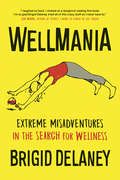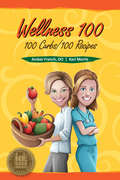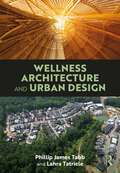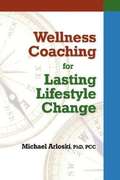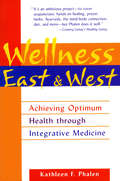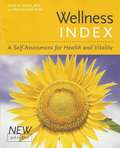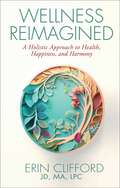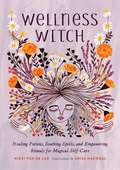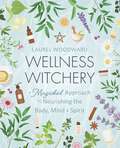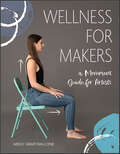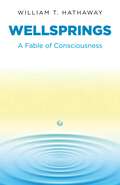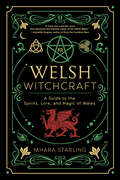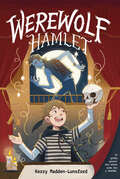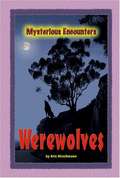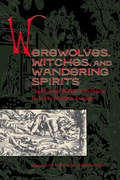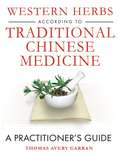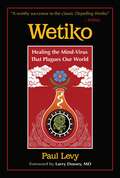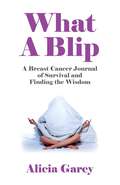- Table View
- List View
Wellmania: Extreme Misadventures in the Search for Wellness
by Brigid Delaney&“Illuminating, thought-provoking, and hilariously honest. You&’ll never look at fasting, yoga, or meditation the same way again.&” —Robyn Harding, USA Today bestselling author of The SwapBridget Jones meets A. J. Jacobs in Wellmania, an in-depth, laugh-out-loud exploration of the best and worst of the wellness industry. Cold-pressed juices, &“clean&” eating, colonic vacations, mindfulness apps, and Paleo: health-care trends and miracle diets seem to be more plentiful each year. But do any of these tactics actually work? What does &“wellness&” even mean? In Wellmania, longtime journalist Brigid Delaney tackles the good, the bad, and the just-a-little-ridiculous of the wellness industry, using herself as the guinea pig. Starting with a brutal 101-day fast, she leaves behind her thirty-something-year-old lifestyle of late-night parties and all-day hangovers to test the things that are supposed to make us healthy and whole: yoga classes, meditation, CBT, Balinese healing, silent retreats, group psychotherapy, and more. Writing with self-deprecating wit and refreshing honesty, she sorts through the fads and expensive hype to find out what actually works, while asking, What does all this say about us? Is total wellness even possible? And why do you start to smell so bad when you haven&’t eaten in seven days? According to comedian Judith Lucy, the result is &“a bloody entertaining read that leaves you wondering whether you want to do yoga or get mindlessly drunk and despair at the state of the world.&” &“I laughed so hard, I choked on a doughnut reading this book. I&’m so glad Brigid Delaney tried all of this crazy stuff so I never have to.&” —Jen Mann, New York Times bestselling author
Wellness 100: 100 Carbs/100 Recipes
by Dr Amber FrenchJust thinking about dieting or eating right can feel overwhelming and heavy for most of us, but Dr. Amber French and chef Kari Morris show us that it doesn't have to be. Winner of the 2013 Indie Next Generation Award in the Diet/Nutrition/Food category, "Wellness 100" presents a realistic and optimistic option with simple guidelines and healthy, easy, and delicious recipes that are respectful of busy lifestyles. Plus, the program naturally works to combat diseases of aging such as heart disease, stroke, cancer, diabetes, and obesity. Can you imagine wanting to eat healthy and enjoying a diet program? With "Wellness 100," you can because it is an attainable lifestyle, not a fad diet. Based on hundreds of studies, research articles, and books by respected authors, the program will teach you how to eat a variety of readily available fresh and colorful foods with the proper amount of carbohydrates and protein for lifelong weight management and better health. "Wellness 100" gets us back to basics, teaching us to make better choices when it comes to our eating habits instead of being lost in a world of confusing food labels and savvy marketing of convenience (processed) foods and fad diets. Shopping, cooking, and eating according to "Wellness 100" guidelines is achievable and rewarding.
Wellness Architecture and Urban Design
by Phillip James Tabb Lahra TatrieleWellness is a contemporary concept with deep ancient roots promoting preventative and holistic activities, lifestyle choices, and salient architecture and urban design practices. Wellness Architecture and Urban Design presents definitions, an analysis of the wellness literature, and a brief history of the wellness movement. Specific planning and design strategies are presented citing examples worldwide and emphasizing the importance of wellness considerations at all scales of the built environment from rooms to cities. Both case studies offer fully integrated and comprehensive wellness design approaches creating resilient and life-enhancing wellness through each of the architecture and urban design scales. The book will be of interest to practitioners and students working in urban design, landscape architecture, architecture, planning, and affiliated fields.
Wellness Coaching for Lasting Lifestyle Change
by Michael ArloskiFor the first time the principles of wellness promotion and personal life coaching are brought together in one volume. Guided by his long experience as a wellness coach, Dr. Arloski blends the wisdom of the coaching profession to bring us an easy-to-use training tool perfect for: wellness professionals, professional coaches, managers, EAP professionals, counselors, and wellness educators. The coaching processes outlined in the book will help you work with your clients to empower them to draw on his or her own abilities and resources to make lasting changes for better health.
Wellness East & West
by Kathleen F. PhalenIn Wellness East & West: Achieving Optimum Health through Integrative Medicine, Kathleen F. Phalen explores the blending of the most effective aspects of medical practices from both sides of the globe.Practical as well as informative, Phalen urges us to be active participants in our own health care. Here you can learn how to take your superficial and deep pulse to discover the efficiency of your organs. To gain further insight into your condition, read the color of your tongue. Most importantly, return to the basics of looking, listening and feeling to lead you and your physician to diagnosis and treatment.
Wellness East & West
by Kathleen F. PhalenIn Wellness East & West: Achieving Optimum Health through Integrative Medicine, Kathleen F. Phalen explores the blending of the most effective aspects of medical practices from both sides of the globe.Practical as well as informative, Phalen urges us to be active participants in our own health care. Here you can learn how to take your superficial and deep pulse to discover the efficiency of your organs. To gain further insight into your condition, read the color of your tongue. Most importantly, return to the basics of looking, listening and feeling to lead you and your physician to diagnosis and treatment.
Wellness Index: A Self-Assessment of Health and Vitality (3rd Edition)
by John W. Travis Regina Sara RyanThis questionnaire is about personal growth and reevaluating existing attitudes and behaviors. Many of our cultural norms subtly reinforce feelings of powerlessness, alienation, or isolation, and often reward illness and non-responsibility. We hope you are excited by the ideas and feelings you experience completing this questionnaire. You can continue learning about wellness by using the Wellness Workbook, from which this questionnaire is drawn. With it, you can learn how to create for yourself an optimal wellness environment, an atmosphere of openness, trust, and honesty.
Wellness Reimagined: A Holistic Approach to Health, Happiness, and Harmony
by Erin CliffordWellness Reimagined: A Holistic Approach to Health, Happiness, and Harmony is a practical, empowering guide to creating a flexible, fulfilling wellness routine tailored to your unique lifestyle and goals—so you can live a life you truly love.Wellness Reimagined is your guide to creating a life that reflects your unique goals, values, and needs. Forget the one-size-fits-all wellness plans—this book is about embracing wellness as an ever-evolving, deeply personal journey. Author and wellness coach Erin Clifford invites you to take a break from the chaos of daily life to redefine what wellness truly means to you. Wellness isn&’t just the absence of illness; it&’s the presence of a vibrant, harmonious life that nurtures your physical, mental, emotional, and spiritual well-being. In this guide, Erin shares a holistic, flexible approach that integrates nutrition, exercise, sleep, stress management, mindful living, and intentional self-care. You&’ll learn to create a lifestyle that aligns with your personal values and helps you thrive, not just survive. Instead of rigid routines, you&’ll explore adaptable habits and realistic goal-setting techniques to enhance every part of your life—whether that means boosting your energy with a mood-enhancing meal plan, establishing a fitness routine that fits a busy schedule, or practicing mindful stress management. With practical tools, resources, and Erin&’s SMART goal-setting strategies, Erin will empower you to set yourself up for success. You&’ll discover how to design a wellness routine that flows with life&’s changes, supporting you in both calm and chaotic times. No need for perfect balance; aim for harmony and build a lifestyle that you love—starting with small steps that lead to meaningful change. Start today, and reimagine wellness on your own terms!
Wellness Witch: Healing Potions, Soothing Spells, and Empowering Rituals for Magical Self-Care
by Nikki Van De Car Anisa MakhoulAdd a touch of magic to your self-care practice with Wellness Witch, a beautifully illustrated guide to mystical rites, sacred rituals, and creative DIYs that will enhance your everyday. Filled with soothing rituals, healing potions, and empowering spells, the Wellness Witch brings a touch of magic to the everyday. Tapping into ancient traditions and feminine power, this enchanting book guides readers through the practices of mystical wellness, natural beauty, and personal creativity as they develop a true intuitive connection to the life-giving forces around us. Drawing on the transcendent power of intention, the Wellness Witch uses tinctures, tonics, mantras, and meditations to forge a magical connection between the body and the spirit. With chapters on the internal, the external, and the home, readers will learn to harness the power of healing herbs, charged crystals, and sacred spaces as they cultivate the art of mystical self-care. Accessible projects, from crafting aromatherapy blends to creating smudge sticks, are paired with calming rituals, yoga sequences, and simple spells to bring peace, power, and magic into our hectic lives.
Wellness Witchery: A Magickal Approach to Nourishing the Body, Mind & Spirit
by Laurel WoodwardHundreds of Herbal Formulas and Recipes for Health, Wealth, and LoveLearn how to eat, meditate, and spellcast your way to a higher quality of life with this book on integrating a magickal mindset into daily life. Laurel Woodward shares more than one hundred herbal formulas, over eighty essential oil blends, more than thirty exercises, and nearly thirty kitchen witchery recipes. Not only will you meet plant allies and nurture a relationship with them, but you'll also find mood-lifting activities and delicious foods for healing body, mind, and spirit.Wellness Witchery shows you the potent power of plants through numerous magickal, herbal, and self-care applications. Laurel provides formulas for boosting immunity, empowering relationships, relieving stress, improving self-esteem, and more. She also offers a variety of magical baths, recipes for treats and beverages, and essential oils for confidence, protection, and inner peace. With them, you can become happier, healthier, and more magickal.
Wellness by Design: A Room-by-Room Guide to Optimizing Your Home for Health, Fitness, and Happiness
by Jamie GoldDesign your home to optimize your healthy lifestyle with this room-by-room guide from certified kitchen designer and wellness design consultant Jamie Gold. Residential designer Jamie Gold has spent years exploring how simple changes to things like lighting, fixtures, storage, and outdoor space can impact our health and wellness. In Wellness by Design, Gold offers a room-by-room guide to refreshing your space so that it supports your wellness journey. Good news, it doesn&’t require a yoga room and can be done in small apartments as well as large houses. This book explains how simple changes can make a huge difference in how you feel every day. You&’ll learn: - How to maximize accessibility and organization in your kitchen for faster, healthier, and more delicious meals. - How to make easy fixes to your ventilation system to help ease symptoms of asthma and allergies - How to optimize your home office to eliminate back, neck, and foot pain. - How to enhance your bathroom tub and shower spaces to support fitness goals and simplify family life. - And much more! It&’s time for your home to work as hard as you do to support your health. With the right organization and interior design, your home can help you maintain and improve your health in a variety of ways, from improving health and preventing disease to encouraging clean eating, sustainable living, safety, fitness, serenity, and joy. Whether you&’re building your dream home or decorating your new rental, this book will help you keep your fitness goals and stay on track for a long and healthy life.
Wellness for Makers: A Movement Guide for Artists
by Missy Graff BalloneLearn the actions, movements, and best practices to help your body—your main craft tool—perform its bestFor artists and craftsmen of all ages to reduce their risk of injury in the studioAuthor is well known as founder of Wellness for Makers®, a company focused on this topic
Wellsprings: A Fable of Consciousness
by William T. Hathaway2026. The earth's ecosystem has broken down under human abuse. Water supplies are shrinking. Rain is rare, and North America is gripped in the Great Drought with crops withering and forests dying. In the midst of ecological and social collapse, an old woman and a young man set out to heal nature and reactivate the cycle of flow by using techniques of higher consciousness. But the corporations that control the remaining water lash out to stop them. A blend of adventure and mystic wisdom, Wellsprings: A Fable of Consciousness is a frightening but hopeful look into a future that is looming closer every day.
Welsh Witchcraft: A Guide to the Spirits, Lore, and Magic of Wales
by Mhara Starling“A modern approach to a magical practice that is rooted in the mythology, folklore, and cultural traditions of Wales . . . a gift of a book.” —Jhenah Telyndru, MA, author of Avalon WithinEnter a world of sacred lakes, healing herbs, spectral hounds, and the mighty red dragon. Written by a Welsh practitioner, this inspiring book shares the magical traditions of Wales—including fairies, folklore, and charms—with dozens of hands-on activities. Mhara Starling shows you how you can incorporate Welsh and Celtic folk magic into your modern witchcraft practice with exercises for celebrating those who came before, protecting against adversity, changing the weather, and more. You’ll also discover methods for honoring the land and ways to connect with Cerridwen, Rhiannon, and other deities. Welsh Witchcraft invites you to explore this country’s rich heritage and use it to empower your spirituality.“A new, fresh, and authentic voice that expresses the timeless magic of her native Wales . . . This book bridges the gap between the ancient and modern and brings authentic, practical Welsh Witchcraft to the table of modern magical traditions. Starling is a powerful new voice that is sure to inspire a generation.” ―Kristoffer Hughes, author of The Book of Druidry “A delightful introduction to Welsh witchcraft which takes readers on a tour of all of the essentials of belief and practice from the perspective of someone who has lived them. The style is engaging and the author deeply knowledgeable on the subject, giving readers a text that is both entertaining and thorough. Highly recommended.” ―Morgan Daimler, author of Pagan Portals
Werewolf Hamlet
by Kerry Madden-LunsfordHumor, heart, and Shakespeare abound in this middle-grade novel about Angus, a 10-year-old theater fanatic, his struggling family, and his changing relationship with big brother Liam.Perfect for fans of books that handle difficult subjects and family dynamics in a sensitive way, like Better Nate Than Ever and Rule of Threes.10-year-old Angus is unique. He quotes Shakespeare and wants to stage a Werewolf Hamlet play for his 5th grade legacy project. Angus's 17-year-old brother, Liam, is like a werewolf now—Angus never knows if he'll be nice or mean or when he'll sneak out to get drunk or worse.Meanwhile, tension continues to build for Liam's family in Los Angeles. Mom and Dad are going to default on the mortgage. Older sister Hannah is fed up and ready to move herself to Maine, and little sister Sidney doesn't really get what's happening. Then Liam goes missing, and Angus decides he has to find him.A realistic, heartfelt look at the complexities of family relationships and struggles. Along with Angus's loveable charm, sense of humor, and desire to stage his original play, Werewolf Hamlet is sure to win its audience—on and off the page—over.
Werewolf Magick: Authentic Practical Lycanthropy
by Denny SargentEmbrace your inner beast. A guide to the essential truths about werewolves and shape-shifting and their practical applications for modern ritualists.Raise your confidence, connect to your primal self, and deepen your spirituality with this empowering book of lycanthropic magick. Featuring authentic shape-shifting rituals, spells, meditations, and folklore, Werewolf Magick shows you how to awaken your inner wolf and transform into a happier, braver, and freer person.Denny Sargent leads you on a life-changing journey into the world of primal magick. This practical book reveals how to embrace your fearless Animalself through dozens of hands-on exercises and ancient techniques. Learn to shed the restrictions of modern society and answer the call of your feral being. Master spiritual shape-shifting and meet wolf deities. Discover effective tools, invocations, and symbols to enhance your practice. This ecstatic guide helps bring forth your powerful werewolf self and reach your full, natural potential.“Denny Sargent's Werewolf Magick challenges us to own and master the liberating power and magick of our own primal roots.” ―Lon Milo DuQuette, author of The Tarot Architect
Werewolves (Mysterious Encounters)
by Kris HirschmannWerewolves were not invented by Hollywood screenwriters. They are based on stories and legends that have endured for thousands of years. From ancient times to the modern day, people have reported seeing and being attacked by these men/beasts. This book explores some of these encounters while giving readers the critical thinking tools needed to separate fact from fiction.
Werewolves, Witches, and Wandering Spirits: Traditional Belief and Folklore in Early Modern Europe (Sixteenth Century Essays & Studies #62)
by Kathryn A. EdwardsBringing together scholars from Europe, America, and Australia, this volume explores the more fantastic elements of popular religious belief: ghosts, werewolves, spiritualism, animism, and of course, witchcraft. These traditional religious beliefs and practices are frequently treated as marginal in more synthetic studies of witchcraft and popular religion, yet Protestants and Catholics alike saw ghosts, imps, werewolves, and other supernatural entities as populating their world. Embedded within notarial and trial records are accounts that reveal the integration of folkloric and theological elements in early modern spirituality. Drawing from extensive archival research, the contributors argue for the integration of such beliefs into our understanding of late medieval and early modern Europe.
Werewolves, Witches, and Wandering Spirits: Traditional Belief and Folklore in Early Modern Europe (Sixteenth Century Essays & Studies)
by Kathryn A. EdwardsBringing together scholars from Europe, America, and Australia, this volume explores the more fantastic elements of popular religious belief: ghosts, werewolves, spiritualism, animism, and of course, witchcraft. These traditional religious beliefs and practices are frequently treated as marginal in more synthetic studies of witchcraft and popular religion, yet Protestants and Catholics alike saw ghosts, imps, werewolves, and other supernatural entities as populating their world. Embedded within notarial and trial records are accounts that reveal the integration of folkloric and theological elements in early modern spirituality. Drawing from extensive archival research, the contributors argue for the integration of such beliefs into our understanding of late medieval and early modern Europe.
Wes Cole's Healthy Habits: How to Change Your Diet and Exercise Habits for Lifelong Fitness
by Wes ColeThis dynamic wellness guide presents the definitive solution for taking control of diet and fitness, guaranteeing healthy changes for life. The detailed plan is broken down into four cycles, providing supportive guidance for gradually altering eating habits and eliminating harmful substances that promote weight gain. An active lifestyle is encouraged through realistic suggestions, until daily fitness becomes second nature. Formulating a patient and supportive approach to optimal health, this handbook promises a lifelong transformation, one proactive step at a time.
Wesley James Ruined My Life
by Jennifer HoneybournCoworker, childhood friend, and worst enemy: the changing dynamics of friendship (and maybe...relationship?) are front and center in this charming debut novel with equal amounts of wit and heart. Quinn is having a rough summer. Her beloved grandmother has been put into a nursing home, her dad’s gambling addiction has flared back up, and now her worst enemy is back in town: Wesley James, former childhood friend and life ruiner. So when Wesley is hired to work with her at Tudor Tymes, a medieval England-themed restaurant, the last thing Quinn’s going to do is forgive and forget. She’s determined to remove him from her life and even the score for once and for all—by getting him fired. But getting rid of Wesley isn’t as easy as she’d hoped. When Quinn finds herself falling for him, she has to decide what she wants more: to get even, or to get the boy.Wesley James Ruined My Life is an engaging romp through rivalry and restaurants from debut author Jennifer Honeybourn and chosen by readers like you for Macmillan's young adult imprint Swoon Reads. Praise for Wesley James Ruined My Life: “Quinn and Wesley are fun, well-developed protagonists, and there is a full cast of interesting secondary characters, too. The book’s even pacing will entice teens from the start and keep them reading…this [is a] pitch-perfect quirky summer romance.” —School Library Journal “The writing is excellent, pacing spot-on, and main character’s voice is sweet and funny.” —Lisa Buscemi Reiss, reader on SwoonReads.com“Immensely readable, utterly charming and absolutely un-put-downable. The duality of Quinn longing to forget Wesley while hurting over being forgotten by her Gran was just beautiful. I got a little weepy. I'm not going to lie.” —Jennifer McKenzie“Sweet, well written and utterly relatable.” —Inna Hardison, reader on SwoonReads.com“I liked the main character, Quinn—she was interesting, loyal and passionate. I was rooting for her the whole time and had to know how her story turned out. She was why I kept reading!” —GoodGothGirlReads, reader on SwoonReads.com
Western Herbs according to Traditional Chinese Medicine: A Practitioner's Guide
by Thomas Avery GarranThe first book to exclusively use Chinese medical theories and terminology to guide practitioners of Chinese medicine in the use of Western herbs • Written entirely according to the theory, diagnosis, and treatment paradigm of traditional Chinese medicine (TCM) • Explains how to combine and modify the standard TCM formulas to non-Chinese herbs suitable for Western practitioners • Includes 58 monographs of common Western healing herbs, detailing how each plant is used clinically The ever-growing number of Chinese medicine practitioners in the West has brought about an amalgamation of many styles of Chinese medicine and various other forms of medicine from around the world. This book addresses the increasing demand for knowledge of how to integrate plants from outside the standard Chinese materia medica into the fold of Chinese medical practices in the West. It is the first in-depth guide to using Western herbs exclusively according to the theories, diagnoses, and treatments of traditional Chinese medicine that harmonizes the unique terminology and theories of TCM with other botanical medicines.The book contains 58 monographs, illustrated with full-color photographs, of herbs commonly used by Western herbalists. Each herb is grouped by the basic categorization for medicinals in Chinese medicine, such as Herbs that Resolve the Exterior and Herbs that Regulate Blood. The monographs detail the energetics, function and indication, channels entered, dosage and preparation, and contraindications of each plant. The author also explains how to use the herbs to modify standard formulas used in everyday Chinese herbal medicine, based on his own clinical experience. An appendix of Western Analogs for Chinese Herbs further highlights 40 Chinese medicinals that have related species growing in the West.
Wet Earth and Dreams: A Narrative of Grief and Recovery
by Jane Lazarre"In the spring of 1995, the condition I seem to have been waiting for all my life finally struck me." So begins Jane Lazarre's account of her transforming battle with breast cancer. Following in the tradition of her critically acclaimed literary memoirs The Mother Knot and Beyond the Whiteness of Whiteness: Memoir of a White Mother of Black Sons, Lazarre brilliantly interweaves her experience of life-threatening illness with other stories of recent and past losses--most notably, that of her mother to breast cancer when Jane was a small child. From these memories and experiences, Lazarre crafts a story that is at once intensely intimate and universally healing.As she contends with the pain and many indignities of her treatment for cancer, Lazarre realizes that successful medical treatment will only be part of her healing process. Her own illness becomes the vehicle for coming to terms with key moments of loss and grief--the death of a beloved therapist from breast cancer, her brother-in-law's death from AIDS, a traumatic disappointment in her work life, and the unresolved pain of being a motherless child. The gift of Lazarre's writing is her ability to transform her narratives of grief and loss into a story whose power to heal lies in its ability to penetrate the unconscious and give voice to the elusive truths hidden there. Through her writing, Lazarre is able to embrace grief--even her own inarticulate grief as a child--and find her way through the story to a restored sense of wholeness.In Wet Earth and Dreams Jane Lazarre once again proves herself to be both companion and guide through some of the most difficult challenges life has to offer. As always, she draws strength not only from sustaining friendship and love, but also from her own faith in the power of storytelling to make bearable the seemingly unbearable. Lazarre's bravely and beautifully written account of grief, illness, and death is at the last a celebration of the redemptive possibilities of the creative spirit.
Wetiko: Healing the Mind-Virus That Plagues Our World
by Paul Levy• Explores how wetiko covertly operates both out in the world and within our minds and how it underlies every form of self-destruction, both individual and collective • Reveals how wetiko&’s power lies in our blindness to it and examines how people across the ages have symbolized wetiko to help see it and heal it • Examines the concept of wetiko as it appears in the teachings of the Kabbalah, Hawaiian Kahuna shamanism, mystical Christianity, and the work of C. G. Jung In its Native American meaning, wetiko is an evil cannibalistic spirit that can take over people&’s minds, leading to selfishness, insatiable greed, and consumption as an end in itself, destructively turning our intrinsic creative genius against our own humanity. Revealing the presence of wetiko in our modern world behind every form of destruction our species is carrying out, both individual and collective, Paul Levy shows how this mind-virus is so embedded in our psyches that it is almost undetectable--and it is our blindness to it that gives wetiko its power. Yet, as Levy reveals in striking detail, by recognizing this highly contagious mind parasite, by seeing wetiko, we can break free from its hold and realize the vast creative powers of the human mind. Levy explores how artists, philosophers, and spiritual traditions across the ages have been creatively symbolizing this deadly pathogen of the psyche so as to help us see it and heal it. He examines the concept of wetiko as it appears in the teachings of the Kabbalah, Hawaiian Kahuna shamanism, Buddhism, and mystical Christianity and through esoteric concepts like egregores, demons, counterfeiting spirits, and psychic vampires. He reveals how visionary thinkers such as C. G. Jung, Sri Aurobindo, Philip K. Dick, Colin Wilson, Nicolas Berdyaev, and Rene Girard each point to wetiko in their own unique and creative way. He explores how the projection of the shadow self--scapegoating--is the underlying psychological mechanism fueling wetiko and examines wetiko in the context of the Covid-19 pandemic, showing that we can reframe the pandemic so as to receive the lessons and opportunities embedded in it. Revealing how the power of imagination can cure the wetiko mind-virus, Levy underscores how important it is for each of us to bring forth the creative spirit within us, which helps shed the light of consciousness on wetiko, taking away its power over us while simultaneously empowering ourselves.
What A Blip: A Breast Cancer Journal of Survival and Finding the Wisdom
by Alicia GareyIt isn't what happens to you, it's what you do when it happens. Through the trauma of breast cancer Alicia Garey came out of the writing closet to share her experience and how she restored her balance. Facing the challenges of motherhood, running an interior design business while also being a wife, daughter, sister and friend, Alicia celebrates the gift of life through a new lens, and finds the joy by seeing the light in her darkest hours. Alicia dedicates her story to all of us who have or will face a terrifying life challenge. As far as she can tell, the challenges do indeed come our way, and we learn from them.
